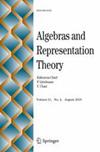准危险性标准
IF 0.6
4区 数学
Q3 MATHEMATICS
引用次数: 0
摘要
Dlab 和 Ringel 证明,在所有阶中,基元幂指数的准遗传代数都是遗传的。因此,我们感兴趣的是,给定的准遗传代数在哪些阶又是准遗传的。事实上,我们考虑的是指数的置换,如果具有置换指数的代数是准遗传的,那么我们就说这种置换给出了准遗传性。在本文中,我们从给定准遗传代数上的标准模块或成本模块的同调条件出发,给出了相邻转置给出准遗传性的标准。本文章由计算机程序翻译,如有差异,请以英文原文为准。
Criterion for Quasi-Heredity
Dlab and Ringel showed that algebras being quasi-hereditary in all orders for indices of primitive idempotents becomes hereditary. So, we are interested in for which orders a given quasi-hereditary algebra is again quasi-hereditary. As a matter of fact, we consider permutations of indices, and if the algebra with permuted indices is quasi-hereditary, then we say that this permutation gives quasi-heredity. In this article, we give a criterion for adjacent transpositions giving quasi-heredity, in terms of homological conditions of standard or costandard modules over a given quasi-hereditary algebra.
求助全文
通过发布文献求助,成功后即可免费获取论文全文。
去求助
来源期刊
CiteScore
1.30
自引率
0.00%
发文量
61
审稿时长
6-12 weeks
期刊介绍:
Algebras and Representation Theory features carefully refereed papers relating, in its broadest sense, to the structure and representation theory of algebras, including Lie algebras and superalgebras, rings of differential operators, group rings and algebras, C*-algebras and Hopf algebras, with particular emphasis on quantum groups.
The journal contains high level, significant and original research papers, as well as expository survey papers written by specialists who present the state-of-the-art of well-defined subjects or subdomains. Occasionally, special issues on specific subjects are published as well, the latter allowing specialists and non-specialists to quickly get acquainted with new developments and topics within the field of rings, algebras and their applications.

 求助内容:
求助内容: 应助结果提醒方式:
应助结果提醒方式:


